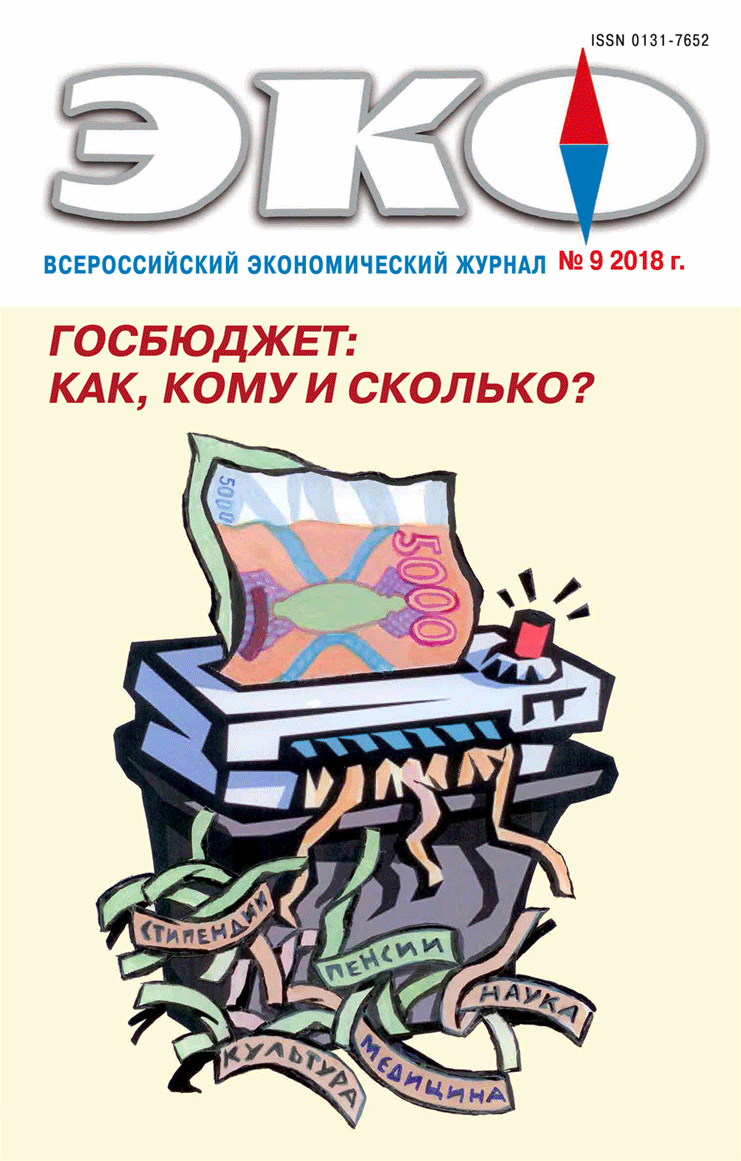COVER STORY: WHAT, WHO AND HOW MUCH
Published 2018-10-15
Keywords
- Public procurement,
- problems of public procurement regulation,
- supplier,
- customer
How to Cite
1.
Yakovlev А, Tkachenko А, Balaeva О, Rodionova Ю. Russian System of Public Procurement: the Law is Changing, the Issues remain. ECO [Internet]. 2018 Oct. 15 [cited 2026 Jan. 20];48(9):17-38. Available from: https://ecotrends.ru/index.php/eco/article/view/1659
Abstract
This article examines the problems of the Russian public procurement system based on the analysis of assessments from a mass survey of both customers and suppliers. It is shown that despite a significant change in legislation, most of the problems that were noted by researchers and practitioners 7–8 years ago remain including price dumping, regulatory collisions and low competition in public bids. The paper analyses the differences in assessments of these problems with respect to the respondents’ experience and other factors. We also claim that one of the reasons for the lack of positive developments in the perception of procurement regulation is that the changes in the legislation were based on the interests of government agencies and did not take into account the needs and opinions of immediate participants of procurement process. On this basis we formulate proposals for conducting regular monitoring of opinions and assessments of ordinary customers and suppliers.References
- Бальсевич А. А., Подколзина Е. А. Причины и последствия низкой конкуренции в государственных закупках в России // Экономический журнал Высшей школы экономики. 2014. Т. 18. № 4. С. 563–585.
- Бальсевич А. А., Пивоварова С. Г., Подколзина Е. А. Региональные различия в относительных ценах государственных контрактов: роль информационной прозрачности // Вопросы государственного и муниципального управления. 2012. № 2. С. 97–111.
- Вольчик В. В. Эволюция институциональной структуры размещения государственного заказа в России // Вопросы регулирования экономики. 2011. Т. 2. № 2. С. 56–67.
- Мельников В. В. Институциональная трансформация механизма государственных закупок в постсоветской России. Новосибирск: Изд–во НГТУ, 2008. 220 c.
- Мельников В. В. Все ли ладно с законодательством о размещении государственных и муниципальных заказов? // ЭКО. 2011. № 1. С. 170–178.
- Мельников В. В. Электронные госзакупки: год спустя // ЭКО. 2012. № 5. С. 174–187.
- Онлайн–исследования в России 2.0. / Сборник статей под ред. Шашкина А. В., Девятко И. Ф., Давыдова С. Г. М.: РИЦ «Северо–Восток», 2010.
- Островная М. В., Подколзина Е. А. Снижение эффективности аукционов и борьба с ограничением конкуренции в государственных закупках // Вопросы экономики. 2014. № 11. С. 41–57.
- Рожков М. А., Балаева О. Н. Проблемы госзакупочной деятельности в России: взгляд заказчика // Госзаказ: управление, размещение, обеспечение. 2009. № 18. С. 62–73.
- Яковлев А. А., Аллилуева О. Г., Кузнецова И. В., Шамрин А. Т., Юдкевич М. М., Якобсон Л. И. Система госзакупок: на пути к новому качеству // Вопросы экономики. 2010. № 6. С. 88–107.
- Яковлев А. А., Балаева О. Н., Ткаченко А. В. Оценка издержек закупочной деятельности региональных госзаказчиков (на примере Калужской области) // ЭКО. 2016. № 1. С. 153–169.
- Dlamini W. and Ambe I. M. The influence of public procurement policies on the implementation of procurement best practices in South African universities // Journal of Transport and Supply Chain Management. 2012. Vol. 6. № 1. P. 277–293.
- European Commission. European Code of Best Practices Facilitating Access by SMEs to Public Procurement Contracts. 2008.
- Nelson Ph. Information and Consumer Behavior // Journal of Political Economy. 1970. Vol. 78. № 2. P. 311–329.
- Darby M. R., Karni E. Free Competition and Optimal Amount of Fraud. Journal of Law and Economics. 1973. Vol. 16. № 1. P. 67–88.
- Ostrovnaya M., Podkolzina E. Favoritism in public procurement auctions: model of endogenous entry / Department of Economics – University of Perugia (IT). Series ISSN2385–2275 «Working papers of the Department of Economics – University of Perugia (IT)». 2015. № 15.
- Mironov M., Zhuravskaya E. Corruption in procurement and the political cycle in tunneling: Evidence from financial transactions data. American Economic Journal: Economic Policy. 2016. Vol. 8. № 2. P. 287–321.
- Moszoro M., Spiller P., Stolorz S. Rigidity of Public Contracts. Journal of Empirical Legal Studies. 2016. September. Vol. 13, Issue 3. P. 396–427.
- Moszoro M., Spiller P. Third–Party Opportunism and the Nature of Public Contracts. Working Paper 18636. National Bureau of Economic Research. 2012. Available at: http://www.nber.org/papers/w18636 (accessed: 10.07.2018).
- Pw C. Public procurement in Europe: cost and effectiveness. PricewaterhouseCoopers. A study on procurement regulation prepared for the European Commission. 2011.
- Zhang Y. Using the Internet for Survey Research: A Case Study. Journal of the American Society for Information Science. 2000. № 51. P. 57–68.

